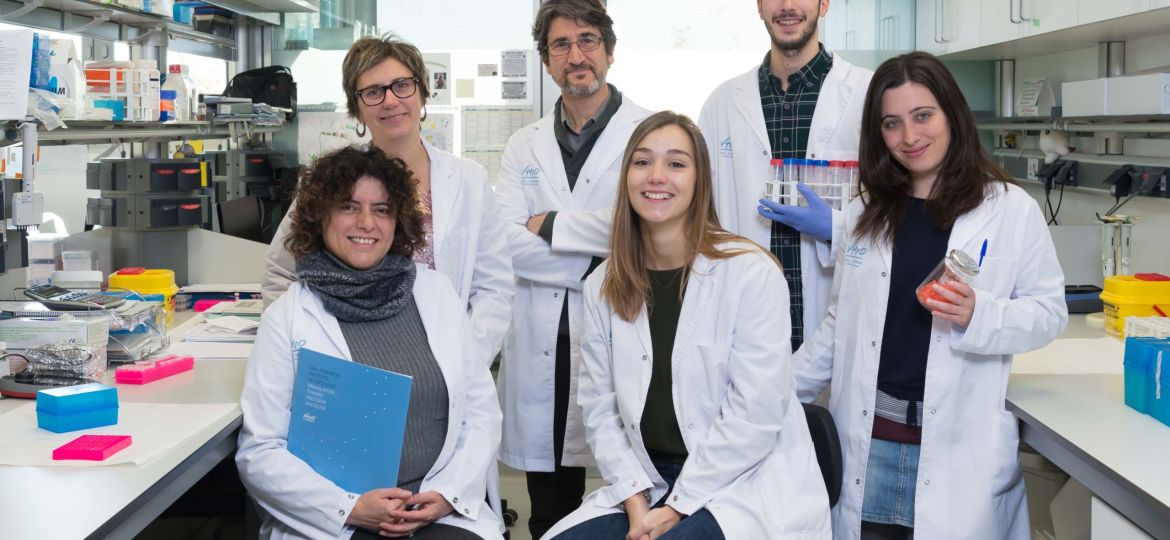
Published this month as an open access Brief Report* in the journal Human Mutation, latest research led by VHIO’s Oncogenetics Group, headed by Orland Diez who is also faculty member of the Vall d´Hebron University Hospital’s Clinical and Molecular Genetics Section (Vall d´Hebron Barcelona Hospital Campus), has led to the comprehensive characterization and clinical classification of a spliceogenic BRCA2 variant that was previously thought to be an innocent bystander in driving breast and/or ovarian cancer risk.
This present case study, first co-authored by VHIO’s Gemma Montalban, Orland Diez, and Sara Gutiérrez as corresponding author, demonstrates the importance of better describing the clinical relevance of genetic variants as generators of complex splicing outcomes.
Hereditary breast and ovarian cancer syndrome (HBOC), triggered by heterozygous germline pathogenic variants in BRCA1 or BRCA2 (BRCA1/2) genes, is characterized by an enhanced risk of developing breast cancer (BC) and/or ovarian cancer (OC). The identification of overtly deleterious BRCA1/2 genetic variants in BC and OC families guides the enrollment of carriers in medical surveillance and cancer prevention programs and better informs treatment decisions by more precisely matching targeted cancer therapies.
Previous molecular studies of both genes have however revealed a significant fraction of rare variants — variants of uncertain clinical significance (VUS). Furthermore, their effect on protein function has remained unclear.
Commenting for VHIO Communications lead author and Graduate Student of our Oncogenetics Group, Gemma Montalban observes, “This represents a major challenge in the genetic counselling of both the carriers and their families. The more precise clinical classification of VUS is crucial since pathogenic carriers can reduce their cancer risk following rigorous screening programs as well as facilitate informed decision making regarding prophylactic surgery and the most appropriate selection of powerful anti-cancer medicines”.
Results reported were concordant in that exon 17 skipping is the predominant transcript occurring in variant carriers, predicted to encode a non-functional protein and the authors consequently classified it as pathogenic.
“We have also detected several alternative isoforms at different expression levels among carriers and controls and have indicated that the difference in expression may be modulated by a common genetic variant. This raises the important question as to whether individual genetic makeup is implicated in modulating alternative splicing and cancer risk”, explains Sara Gutiérrez, Senior Scientist of the same group.
With the application and extension of next-generation sequencing technologies to the clinical realm, the number of genetic variants identified in both in germline and tumor DNA that require assessment at RNA level is naturally increasing, as are the many yet unresolved questions in solving cancer sooner.
“Contributing to a better understanding of genetic variants and their impact on splicing will facilitate a more in-depth clinical interpretation and help us to better inform our patients with a more accurate genetic diagnosis”, adds Orland Diez, Principal Investigator of Oncogenetics at VHIO.
Carried out in collaboration with VHIO’s High Risk and Cancer Prevention Group spearhead by Judith Balmaña and colleagues at the Instituto de Biología y Genética Molecular (Valladolid) and the Clinical Hospital San Carlos and University Hospital La Princesa (Madrid), the relevance of their findings are such that the paper was hand-picked as an Editor’s Choice article and an image submitted by Gemma Montalban was selected for the back cover of this month’s September issue in print.
To access the paper please click here.
###
* Montalban G, Fraile-Bethencourt E, López-Perolio I, Pérez-Segura P, Infante M, Durán M, Alonso-Cerezo MC, López-Fernández A, Diez O, de la Hoya M, Velasco EA, Gutiérrez-Enríquez S. Characterization of spliceogenic variants located in regions linked to high levels of alternativesplicing: BRCA2 c.7976+5G > T as a case study. Hum Mutat. 2018 Sep;39(9):1155-1160.








